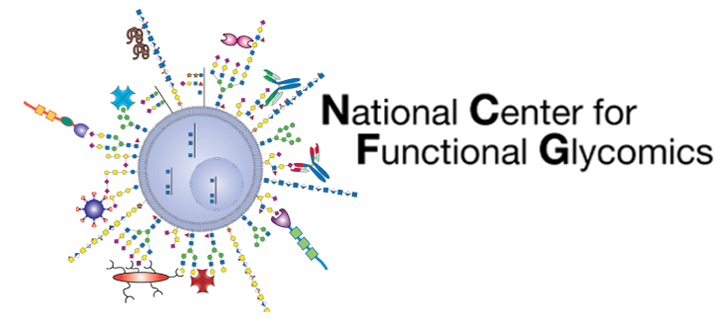Luyai A, Heimburg-Molinaro J, Prasanphanich NS, Mickum M, Lasanajak Y, Song X, Nyame K, Wilkins P, Rivera-Marrero C, Smith D, et al. Differential expression of anti-glycan antibodies in schistosome-infected humans, rhesus monkeys and mice.. Glycobiology. 2014;24(7):602–18.
Abstract
Schistosomiasis is a debilitating parasitic disease of humans, endemic in tropical areas, for which no vaccine is available. Evidence points to glycan antigens as being important in immune responses to infection. Here we describe our studies on the comparative humoral immune responses to defined schistosome-type glycan epitopes in Schistosoma mansoni-infected humans, rhesus monkeys and mice. Rhesus anti-glycan responses over the course of infection were screened on a defined glycan microarray comprising semi-synthetic glycopeptides terminating with schistosome-associated or control mammalian-type glycan epitopes, as well as a defined glycan microarray of mammalian-type glycans representing over 400 glycan structures. Infected rhesus monkeys generated a high immunoglobulin G (IgG) antibody response to the core xylose/core α3 fucose epitope of N-glycans, which peaked at 8-11 weeks post infection, coinciding with maximal ability to kill schistosomula in vitro. By contrast, infected humans generated low antibody levels to this epitope. At 18 months following praziquantel therapy to eliminate the parasite, antibody levels were negligible. Mice chronically infected with S. mansoni generated high levels of anti-fucosylated LacdiNAc (GalNAcβ1, 4(Fucα1, 3)GlcNAc) IgM antibodies, but lacked a robust response to the core xylose/core α3 fucose N-glycan antigens compared with other species studied, and their sera demonstrated an intermediate level of schistosomula killing in vitro. These differential responses to parasite glycan antigens may be related to the ability of rhesus monkeys to self-cure in contrast to the chronic infection seen in humans and mice. Our results validate defined glycan microarrays as a useful technology to evaluate diagnostic and vaccine antigens for schistosomiasis and perhaps other infections.
Last updated on 03/06/2023
